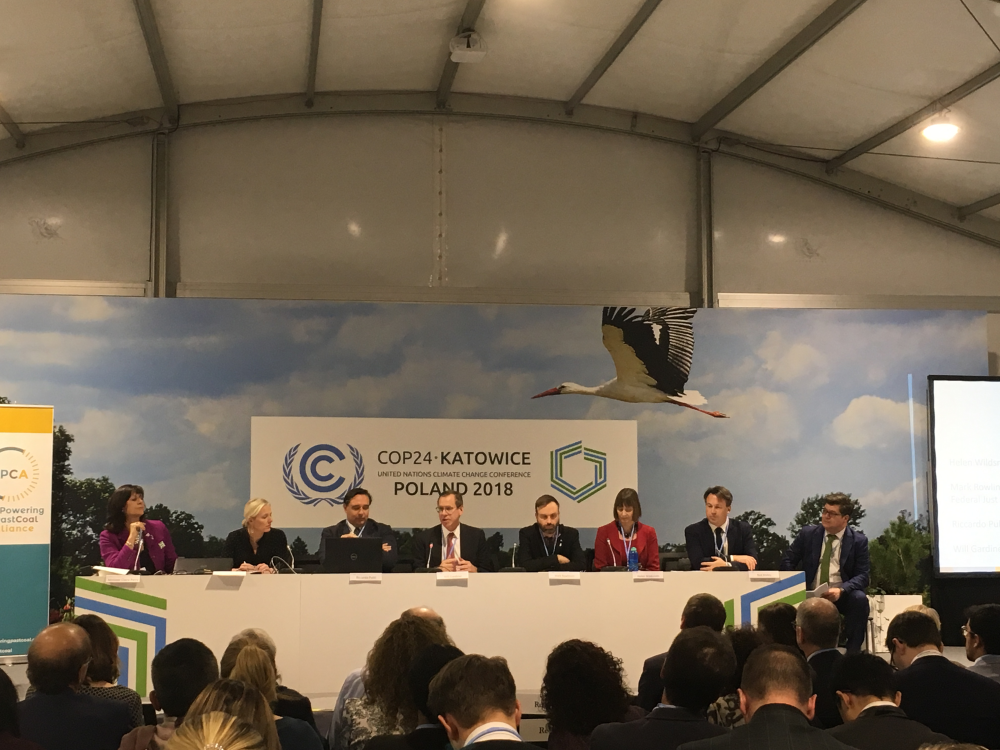Pembina Institute staff Isabelle Turcotte and Binnu Jeyakumar are in Katowice, Poland from December 2 to the 15 to follow the development of the 24th Conference of the Parties (COP) of the United Nations Framework Convention on Climate Change (UNFCCC), and what this means for climate action in Canada.
It is a sign of the times that even at a conference in the middle of coal-dependent Poland, there is a strong coalition discussing transition off coal. At the Powering Past Coal Alliance (a global coalition co-founded by Canada and the United Kingdom) press conference yesterday, it was quite the sight – seated at the front of a 300-person meeting hall (with standing room only) were a diverse set of leaders representing many of the stakeholders in the global coal transition. The panelists included UK Minister Claire Perry, Canada’s Minister Catherine McKenna, Riccardo Puliti from the World Bank, Will Gardiner from the UK electricity generator Drax, Mark Rowlinson from Unifor Canada, Jan Willem van de Ven from the European Bank for Reconstruction and Development, and Nick Mabey of E3G, a climate change think tank.
The Powering Past Coal Alliance was launched at last year’s United Nations climate conference (COP), in Bonn, Germany. At this meeting one year later, several parties have a renewed sense of urgency with the release of IPCC's latest report (commonly known as the 1.5 degree report). Many view the coal phase-out to be a critical step that must be implemented promptly in light of this renewed urgency. This is evidenced with a broader momentum away from coal and towards clean energy. The membership of the PPCA has expanded from 25 to 80 and includes utilities and financial institutions, as well governments at the city, state, and country level. This year’s meeting also dove more into the implementation of the coal phase-out, the role of different stakeholders, and how to address complex challenges such as just transition of workers.
Globally, over the last year we’ve seen an evolution of the dialogue around coal. For example, we used to discuss how long it would take for renewables to become cheaper than coal, and now we’re seeing evidence that it’s already happening. The Carbon Tracker Initiative released an insightful analysis on the economics of coal that concludes 42 per cent of the coal plants in the world are already running at a loss. In the U.S., new renewable energy is cheaper than existing coal today.
Similarly, at this year’s conference there are more and more groups discussing the issues of just transition for affected workers and communities. Solutions are being examined from the perspective of workers, communities, investors, utilities, and governments. It’s been encouraging to see all the necessary and affected actors around the same table, discussing solutions. Samantha Smith from the International Trade Union Confederation best summed up the sentiment of many environmental and labour leaders: "Unions are working on climate ambition. Just transition is a way to go faster and together.”
As the world moves forward with a transition away from coal-fired power, Canada continues to play a leadership role. This week, Canada finalized and published its coal phase-out regulations, giving clarity and certainty for the country's move towards being free from coal pollution by 2030. While the details of equivalency agreements with provinces need to be figured out, and the replacement generation mix needs to be determined, this is a significant step in reducing Canada's GHG emissions and providing a strong signal of the country decarbonizing its grid. At the same time, Canadian unions have been vocal advocates of just transition, placing it dead centre on the agenda of Canada's announcements at COP as well as of the discussions among other nations here at COP.
All in all, these developments are cause for optimism. They show a significant momentum towards phasing out one of the dirtiest sources of energy and causes of air pollution, and an evolution of practical solutions to enable the transition.







